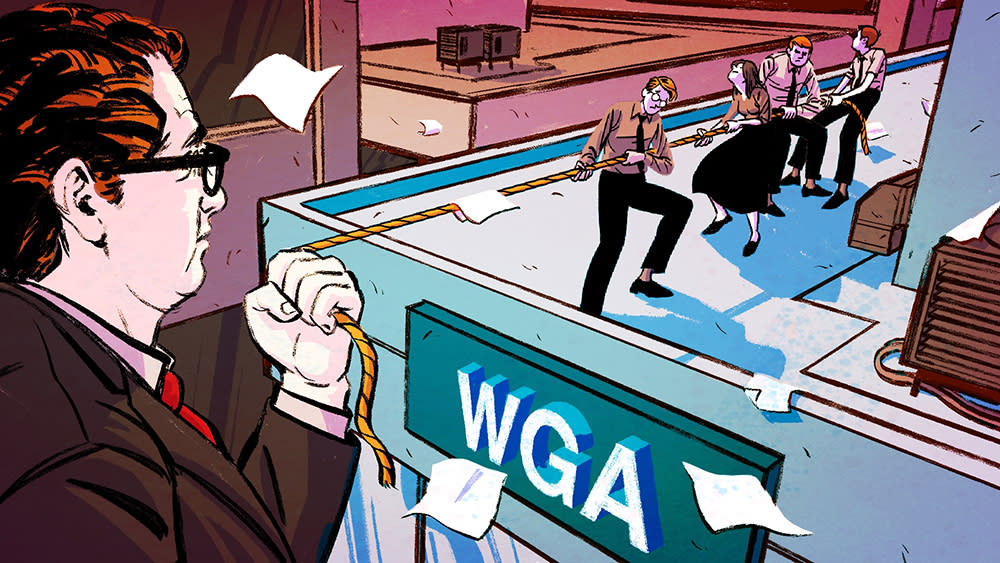WGA Agrees to Six-Day Delay for Tightened Agency Rules

The Writers Guild of America has announced a six-day delay on implementing tightened rules on Hollywood agents, temporarily averting a potentially chaotic scenario that has unnerved the industry in recent days.
The WGA announced in a message to members at 9:26 p.m. Pacific Time on Saturday that it would wait until 12:01 am on April 13 to implement its new “Code of Conduct.” The rules — which would have required WGA members to fire their agents had they not signed the code — would have gone into effect a few hours later at 12:01 a.m. Sunday.
Related stories
Inside the WGA-ATA Meeting That Led to Reprieve in Agency Battle
WGA, Top Agencies Poised for Bitter Break as Franchise Agreement Expires at Midnight
The move came after a three-hour meeting between guild leaders and talent agents a few hours earlier on Saturday afternoon, according to the WGA’s negotiating committee. The get-together at WGA West headquarters in Los Angeles had been kept under wraps and many were caught by surprise when the delay on implementing the WGA code was announced. Neither side disclosed specifics on the apparent compromises.
The WGA was repped by WGA West Executive Director David Young, showrunners David Shore and Mike Schur and screenwriter Michelle Mulroney. The agencies were repped by WME’s Rick Rosen, UTA’s Jay Sures, CAA’s Bryan Lourd, APA’s James Gosnell and Karen Stuart, executive director of the Association of Talent Agencies. Gosnell is president of the ATA.
“We had a frank and open conversation and, for the first time, the agencies acknowledged the depth of the problem that their behavior has caused,” the WGA committee said. “In that meeting, they asked us to delay implementation of the Code until end of day Friday, April 12th, so that they could present us with proposals to address those problems and reach a settlement.”
The Code of Conduct, which was overwhelmingly approved by WGA members in late March, requires that agencies agree to eliminate television packaging fees and ownership interests in production companies — demands that the agents had contended were not feasible. The WGA has asserted that the practices amount to inherent conflicts on interest and threatened several times to file suit against CAA, WME, UTA and ICM Partners.
Saturday’s meeting between the two sides came after seven formal negotiating sessions between Feb. 5 and March 26 had been largely unproductive. The WGA and the ATA had both shown virtually no inclination to compromise. But Saturday’s session swayed the WGA leaders amid mounting concerns in Hollywood that the wholesale firing of agents would create widespread turmoil.
“In a sincere effort to find agreement, we have accepted that request,” the committee said. “In so doing, we are fulfilling our pledge to you – and the language of your authorization – that we use our best judgment as to the right time to move. But Friday at midnight, which the agencies themselves proposed, is a true deadline. Unless we have an agreed-upon deal, the WGAW Board and WGAE Council have voted that the Code of Conduct will go into effect at 12:01 am on Saturday, April 13th. From that point on, diplomacy can continue alongside powerful collective action.”
The committee also noted that the agents should have begun to offer significant compromises in their positions instead of waiting until Saturday.
“All of this might have happened last week,” the panel said. “Instead, real negotiations begin now, as they always do, with a ticking clock. It is your power – membership power – and your willingness to use it – that has brought us this far. Conflicted practices and misaligned financial incentives have plagued our relationships with our representatives for too long. We sincerely hope that the agencies will now become our true partners in a joint effort to deal meaningfully with both.”
Stuart said in a message to her members Saturday night that the agents had initiated an informal meeting Friday with the WGA to discuss a pathway and process for moving forward in negotiations.
“Today, a small group of representatives from ATA and WGA met for several hours on a wide range of issues important to both writers and agents,” she added. “Tonight, we mutually agreed to extend the termination of our existing agreement through Friday, April 12 and committed to meeting regularly this week in our continued effort to work towards a resolution that serves the best interests of your businesses and your clients. In the meantime, I continue to welcome your thoughts and look forward to seeing you at Wednesday’s membership meeting, where we will update you further.”
A day earlier, Stuart had dismissed the WGA’s most recent proposals, asserting that they would give the WGA power over agency business operations and “an unprecedented level of control” to dictate agency operations.
The WGA formally notified the ATA a year ago that it wanted to re-open negotiations on the Artists Manager Basic Agreement, which governs how agents represent WGA members, creating a 12-month expiration calendar. The guild had become increasingly alarmed over the moves by CAA, WME and UTA into production and the potential for conflicts of interest that arise when the same company represents the creative talent on one side of the table and is the employer on the other.
Sign up for Variety’s Newsletter. For the latest news, follow us on Facebook, Twitter, and Instagram.

